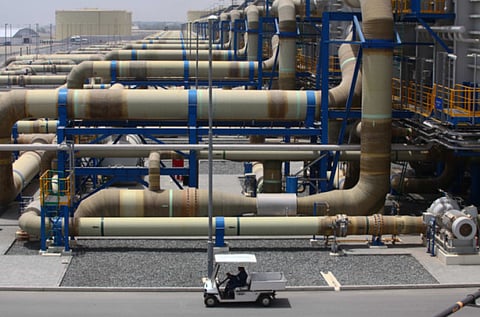Freshwater law in the pipeline
With the increase in demand for drinking water, the UAE is exploring all options to replenish reserves

The demand for potable water in the GCC will reach 11.9 million cubic metres a day by 2025, according to a GCC-comissioned study last year. Meanwhile, groundwater sources in the region are limited and do not exceed 50 billion m3 per year, say experts.
“Surface water resources in Mena are estimated to be about 224 billion m3 per year, of which 77 per cent comes from outside the region. Limited availability of freshwater and renewable resources, coupled with large-scale exploitation, is widening the demand-supply gap. Unsustainable extraction was highest in the UAE and Saudi Arabia. This, however, is changing with an increased focus on waste water recycling,” says Kshitij Nilkanth, Programme Manager at Environment and Building Technologies Practice, Frost & Sullivan.
GCC governments have allocated about $100 billion (about Dh367 billion) towards implementing better water technologies and energy-efficient desalination,” he adds (see box).
Meanwhile, the UAE is looking at a national bill to address the issue. “For the moment, the ministry along with stakeholders is crafting a national bill for rationalising fresh water consumption,” said Dr Rashid Ahmad bin Fahad, the UAE Minister of Environment and Water, while speaking to the media in January. “The UAE is currently undertaking a national strategy for improving water resources management, replenishing strategic water reserves, developing legislative, economic and technical standards, and building local capacities on integrated water resources management and sustainable development of natural resources,” he added.
He adds that 116 dams were built with a total capacity of 11 million cubic metres to sustain natural water resources. The UAE has also utilised unconventional resources such as desalinated water as a key source for fresh water.
Currently, the UAE uses more than 70 per cent of domestic energy to supply and transport water. According to the Environment Agency — Abu Dhabi, 72 per cent of the water used in the UAE comes from groundwater, 21 per cent comes from desalination and only 7 per cent is treated water.
In January, six international consortiums were pre-qualified to bid for Abu Dhabi’s ninth independent water and power project (IWPP), which is the 1,500-megawatt (MW) and 55-million-gallon-per-day Mirfa plant located 160 kilometres from Abu Dhabi on the Gulf coast.
The winning developer, expected to be chosen by mid-2013, will take a 40 per cent stake in the company while the Abu Dhabi Water & Electricity Authority (Adwea) will hold the rest. “Several GCC countries have planned IWPPs and their construction was scheduled to commence in 2012. In the past five years, Reverse Osmosis (RO) has established itself as a reliable and efficient technology for desalination. The planned plant capacities of RO are increasing every quarter in the GCC,” says Nilkanth.
Fewa, the electricity and water authority for Ajman, Ras Al Khaimah, Umm Al Quwain and Fujairah, will implement ultra filtration as a pretreatment step for the first time at its Al Zawrah seawater RO plant in Ajman to produce 115 million litres per day of pretreated seawater to feed the RO membrane system.
$725bn set aside for GCC water projects
The GCC has the highest per capita consumption of water in the world and an increasing demand and supply gap is creating an imbalance, says Kshitij Nilkanth, Programme Manager at Environment and Building Technologies Practice, Frost & Sullivan. But all is not lost. “Governments and policymakers have taken cognisance of the situation and steps are being taken to promote efficient water use,” he says.
In January industry think tank Global Water Intelligence (GWI) reported major planned investments by Gulf countries amounting to as much as $725 billion (about Dh2 trillion) over the next two decades. Between 2013 and 2017 Qatar plans to invest some $1.1 billion in desalination capacity through independent water and power projects (IWPPs).
Kuwait has a combined municipal water/waste water capital expenditure budget of $4.4 billion from 2013 to 2016, the UAE water budget reaches $13 billion while Saudi Arabia is expected to spend about $53.9 billion over the next two decades to build, operate and maintain water projects, according to GWI estimates. In July 2012, reports noted that the Public Authority of Electricity and Water in Oman plans to build strategic reservoirs in Muscat in order to overcome crisis situations.
Last year a GCC-commisioned study recommended a common water network linking all GCC countries be established to prevent future shortages. It also proposed that two desalination centres for the network in times of regular demand — one to produce to meet the need, and the other as an emergency reserve.



